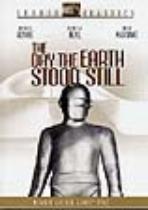The Day the Earth Stood Still
 Year:
Year: 1951
Film Studio: Twentieth Century-Fox
Genre: Science-Fiction, Classic, Drama
Length: 92 Min.
DirectorRobert Wise (1914)
WritingEdmund H. North (1911)...Screenplay
Harry Bates (1900)...Story
ProducerJulian Blaustein (1913)
CinematographerLeo Tover (1902)
MusicBernard Herrmann (1911)...Music
StarsMichael Rennie (1909) as Klaatu
Patricia Neal (1926) as Helen Benson
Hugh Marlowe (1911) as Tom Stevens
Sam Jaffe (1891) as Professor Jacob Barnhardt
Billy Gray (1938) as Bobby Benson
Frances Bavier (1902) as Mrs. Barley
Lock Martin (1916) as Gort
Review The Fifties would usher in a new wave of Cold War era films that would depict the growing fear of Communist infiltration and nuclear annihilation. Hollywood itself was fighting its own version of a Cold War with the new medium of Television. This would lead to the introduction of Cinemascope, 3-D, and Drive-in theaters. The main vehicle for profiting on the nations fears would be the Science Fiction film. Over the next decade an endless array of creatures, monsters and organisms would come to our planet and try to erase our species from the face of the Earth. One film at the beginning of the decade chose to take a different path. It would show the public that evil didn't come from far away, but came from inside us. Its message was clear; we as intelligent creatures inhabiting the Earth had the ability to choose peace over mass destruction.
On a bright sunny day in the nation’s capitol, the day-to-day routines of the cities populace are disturbed by the warnings of an unidentified flying object that is orbiting the Earth. When the UFO turns out to be a spaceship from another world, fear grips the inhabitants as the alien craft lands in a nearby park in the capitol. As the Army surrounds the spacecraft with tanks and artillery, ready to blast it to smithereens, a gangway appears from an opening in the ship and a humanoid appearing alien emerges from inside. The alien is holding an apparatus unknown to the soldiers and onlookers who have gathered at the landing site. When the apparatus is opened, a nervous soldier shoots it out of the alien’s hand, destroying it and wounding the stranger in the process. As the soldiers move toward the wounded spaceman, a gigantic robot emerges from the spaceship and fires a laser, destroying all of the Army’s weapons. With instruction from the alien, the robot ceases its attack and the alien, who introduces himself as Klaatu (Michael Rennie), explains to the soldiers that the device they just destroyed would have enabled world leaders to communicate with other planets in the universe.
Klaatu is taken to Walter Reed hospital where he is treated for his wound and asks a diplomat to gather the leaders of all the nations on Earth to meet with him and discuss his mission to our planet. When he is told that this is not feasible due to tensions between the Earth’s nations, Klaatu does not understand why. To get a better sense of the creatures he’s dealing with, Klaatu escapes from the hospital and into the vast city. At a boarding house where he will stay for the time being, he meets a young widow named Helen Benson (Patricia Neal) who will be pivotal in not only Klaatu’s survival, but in the survival of all mankind. With his intentions unknown and after a display of his species power and ability to control simple Earth physics, the Army steps up its search for the alien.
Fearing that his pursuers will kill him, Klaatu entrusts the world’s welfare to Helen who has agreed to help him succeed in his mission. If something happens to Klaatu, he has instructed her to repeat a phrase to the robot that will stop him from destroying the Earth. When Klaatu is gunned down on a Washington street, she hurries to the spaceship and recites the four words that all science fiction lovers know by heart;
Gort, Klaatu barada nikto. This phrase sends Gort on a mission to retrieve Klaatu’s body and take it back to the spaceship, where alien technology brings Klaatu back from the dead. This is one of many allegorical metaphors in the film depicting the alien as a Christ-like figure guiding us towards our inevitable judgment day.
Klaatu emerges from the spaceship with a warning to the population of the Earth; live in peace or descend into the abyss of Hell, it was our choice. If we failed to curb the aggression that was so inherent in us all, we would be responsible for our own extinction. Unfortunately, this message didn't sink in with the viewing public and the politicians of the time and we would spend another 38 years living with the fear of one madman pushing the button, and bringing about a nuclear Armageddon.
Ratings Criterion5 Stars - The pinnacle of film perfection and excellence.4 ½ Stars - Not quite an immortal film, yet a masterpiece in its own right.
4 Stars - Historically important film, considered a classic.
3 ½ Stars - An entertaining film that’s fun or engaging to watch.
3 Stars – A good film that’s worth a Netflix venture.
2 ½ Stars - Borderline viewable.
2 Stars – A bad film that may have a moment of interest.
1 ½ Stars – Insipid, trite and sophomoric, and that's its good points.
1 Star – A film so vacuous, it will suck 2 hours from the remainder of your life.
½ Star - A gangrenous and festering pustule in the chronicles of celluloid.